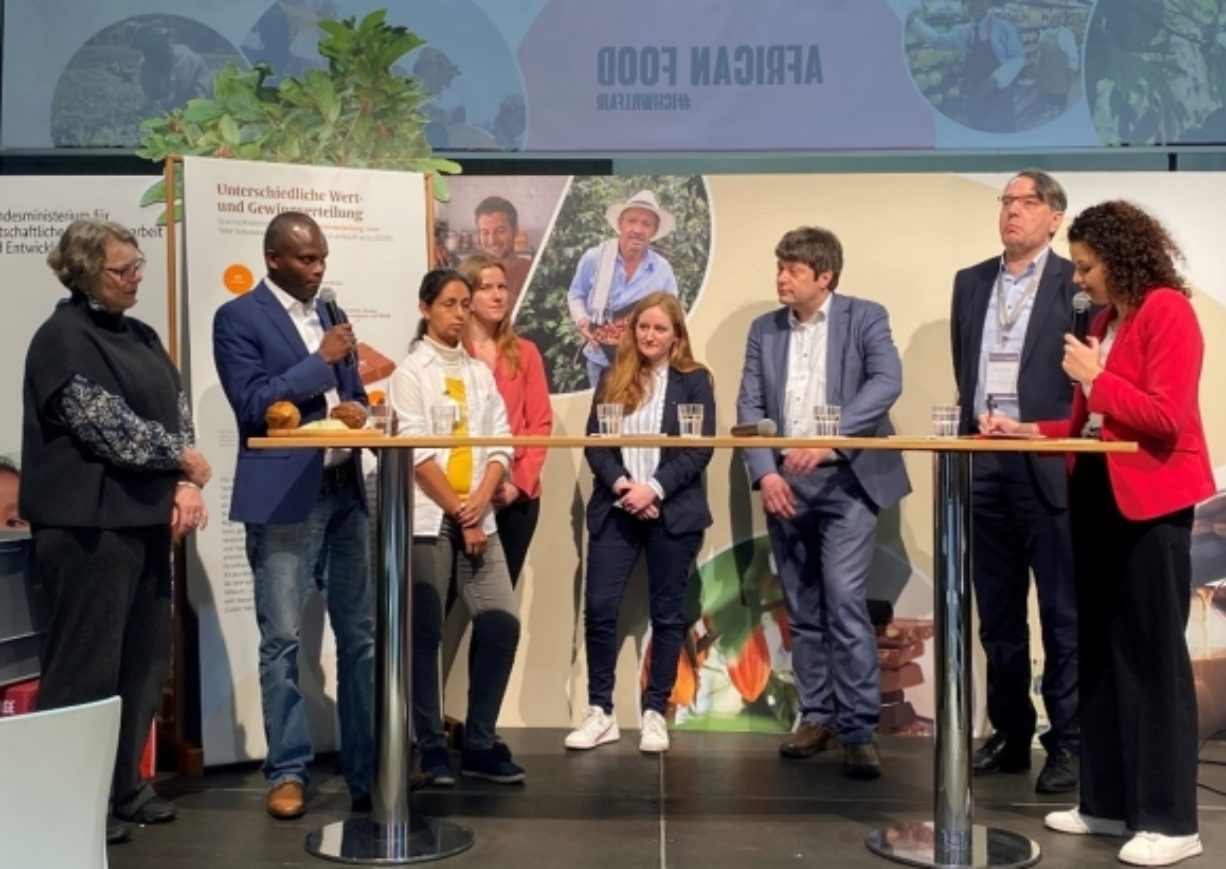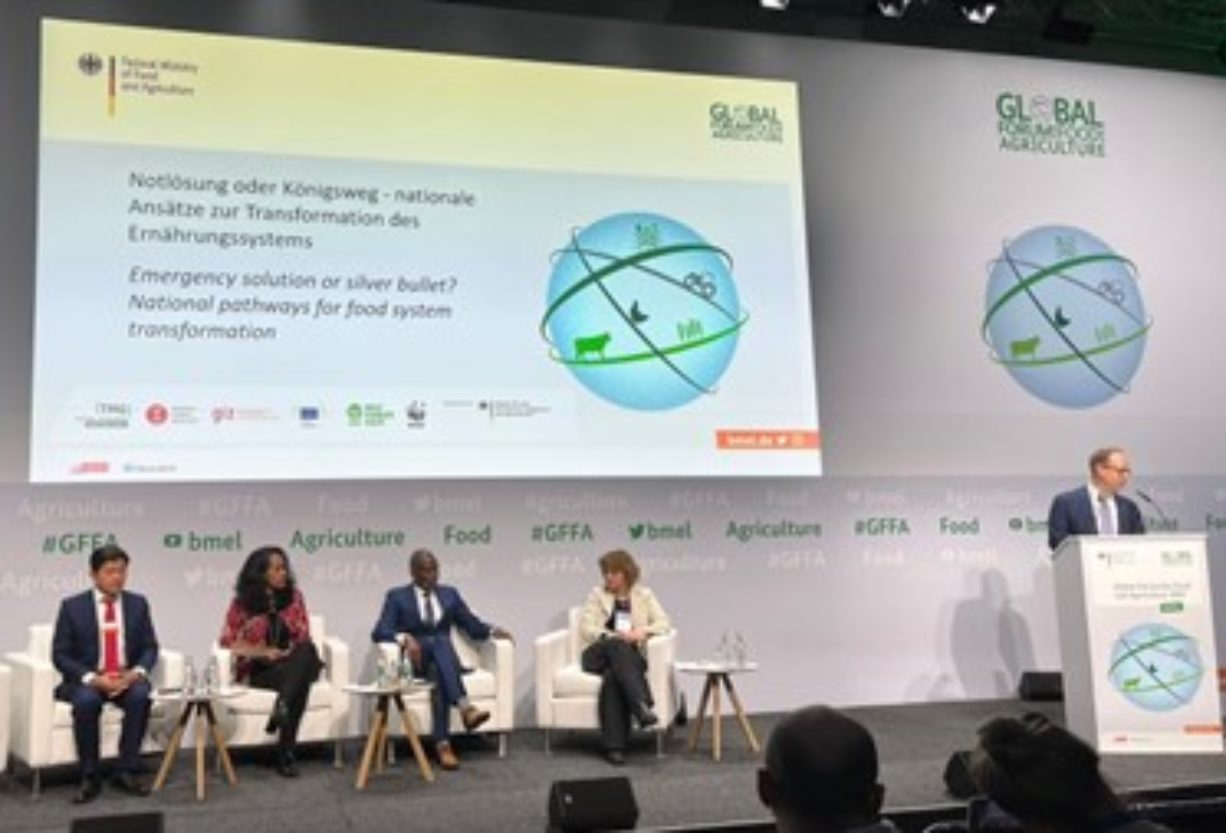
Before the official part of the Global Forum for Food and Agriculture – let alone International Green Week – even got underway, the AHA was already immersed in discussions on food systems. As it happens, the hustle and bustle was preceded by an intensive two-day workshop entitled “Steering the Transformation of our Food Systems”, organised in close cooperation between the AHA and the sustainability think tank TMG, GIZ, Welthungerhilfe, the WWF and the European Commission.
The viewpoints of invited representatives from farmers’ organisations from Kenya, Malawi and India were complemented by those from the private sector, youth, government and science from these same countries, as well as from Cambodia. Together, they shared and discussed their countries’ progress. Empowerment, adaptability, transparency and accountability, resilience and a multi-stakeholder approach are just a few of the major concepts that conversations focused on. Together, they coordinated demands made on donor countries regarding how the latter can support transformation while fulfilling their own responsibilities in the system. Participants presented these demands to representatives from the BMZ and the European Commission as part of an internal round-table discussion during which the central position of organised agriculture within a holistic process of change and transformation was emphasised several times. How fortunate that the AHA had brought together dozens of leading representatives almost a year before to discuss this very issue. We are now building on these results!
Events continued the next day. On Friday 20 January, some of the workshop participants gathered once again for an expert panel – this time open to the public in the City Cube – and including inter alia Dr. Mwendah M’Mailutha, CEO of KENAFF. Before a large audience they discussed implementation of the National Pathways that each country launched just over a year ago and which are guiding our future food systems.

But it was not only these guests that had the opportunity to participate in important international talks and discussions – the AHA together with the WFO (World Farmers’ Organisation) invited further international guests to take part in an expert panel. Here, the WFO President, the President of AgriCord, the CEO of PAFO (Pan-African Farmers Organisation), the Director of Sustainable Production, Markets and Institutions of IFAD, the Global Director for Agriculture and Food of the World Bank Group and the Director of Policy and International Engagement from the World Resources Institute for Food and Land Use Coalition discussed “Investing in local farmers’ solutions to address global food system challenges”.
Furthermore, our guests were invited to participate in various on-stage programmes and round-table discussions to hear their perspectives on the issue of food security and climate change. For example, Shamika Mone, President of the International Network of Organic Farmers’ Organisations (INOFO), spoke on the BMZ stage with State Secretary Mr. Flasbarth and then met again with Mr. Lesch from BMZ to discuss sustainable agriculture. Dr. Mwendah M’Mailutha, KENAFF CEO, spoke with GIZ on the topic of “The soil – grounds to live” and presented the challenges of the agricultural and food system from the perspective of farmers.
On Sunday 22.01.23, the AHA and its guests continued to devote themselves to the topic of “Trees as a solution!” Farmers’ associations break new ground”. What can help deal with climate change, drought, erosion, depleted soils and pest infestations? Furthermore, what can a business model offer that uses carbon sequestration and promotes biodiversity? Trees are all-rounders, a fact that the Kenyan national farmers’ association KENAFF has also rediscovered. In this way, it is accompanying its members in introducing agroforestry, undertaking reforestation itself, establishing decentralised tree nurseries, advising its members on the use of woody landscape plants and it plans to start trading CO2 certificates.
During its on-stage programme, the AHA offered those wishing to break new ground together open discussion between African and German agricultural representatives.
This could be of interest to you:
-
International Cooperation -
International Cooperation How NWAB in Zambia is forging stronger ties with its members
Read -
International Cooperation Young agricultural stars in western and southern Africa
Read
